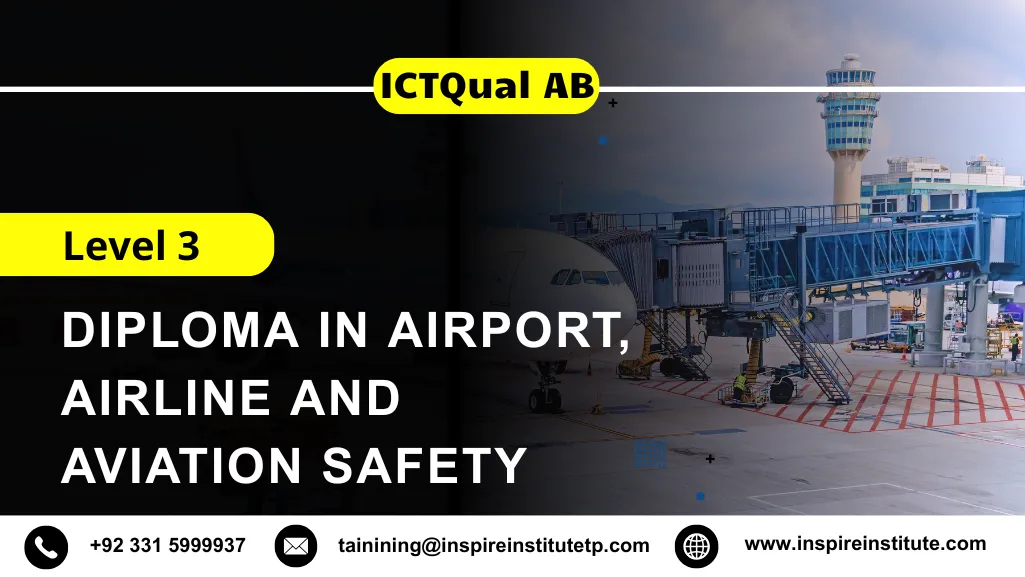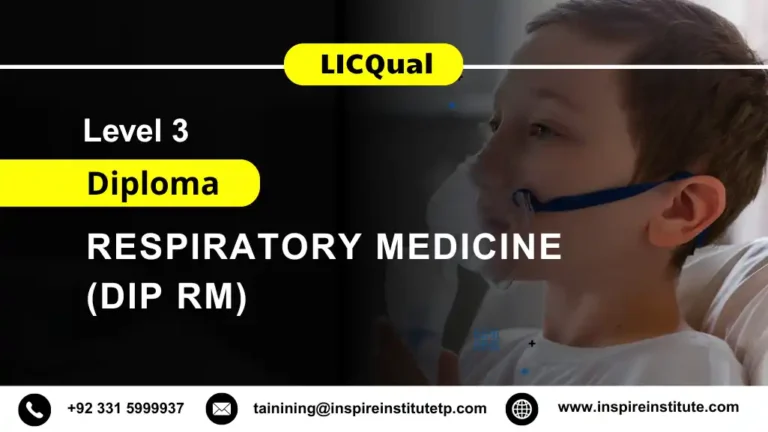ICTQual AB Level 3 Diploma in Airport, Airline and Aviation Safety
The ICTQual AB Level 3 Diploma in Airport, Airline and Aviation Safety is a globally recognized qualification designed for learners who aspire to build a career in the aviation industry. This comprehensive aviation safety diploma Level 3 equips students with the essential knowledge and practical skills required to ensure safe and efficient operations across airports and airlines.
Covering critical areas such as airport safety training, airline safety management, and aviation risk management, the course aligns with international standards, including ICAO guidelines, making it a trusted pathway for professionals seeking global aviation career qualifications. Learners gain expertise in airport operations and safety certification, airline operations Level 3 course modules, and aviation safety and compliance training, ensuring they are prepared to meet the challenges of modern aviation environments.
The diploma emphasizes both theoretical understanding and applied learning, helping participants develop competencies in aviation safety certification for careers and airport security and safety diploma requirements. Whether you are entering the aviation sector for the first time or looking to enhance your existing expertise, this professional diploma in aviation safety provides a strong foundation for career progression.
Graduates of the ICTQual AB Level 3 Diploma are well-positioned to pursue roles in airport management, airline operations, and aviation safety compliance worldwide. With its focus on international standards and practical application, this international aviation safety qualification is the ideal choice for learners seeking to advance in one of the most dynamic and safety-critical industries.
Why Choose this Qualification
The ICTQual AB Level 3 Diploma in Airport, Airline and Aviation Safety is designed to provide learners with internationally recognized skills and knowledge that directly support career growth in the aviation industry. This qualification combines practical training with compliance-focused learning, ensuring graduates are prepared for both operational and managerial responsibilities in airports and airlines worldwide.
Globally Recognized Qualification
- Accredited and respected across international aviation markets
- Meets ICAO-compliant safety and operational standards
- Enhances credibility for career progression worldwide
- Accepted by airlines, airports, and aviation authorities
- Provides a competitive edge in global recruitment
- Builds confidence in professional aviation safety roles
- Strengthens employability in diverse aviation sectors
Comprehensive Aviation Safety Training
- Covers airport safety, airline operations, and aviation risk management
- Focuses on compliance with international safety regulations
- Includes modules on airport security and passenger safety
- Provides practical case studies and real-world applications
- Develops skills in safety audits and incident prevention
- Prepares learners for operational and managerial responsibilities
- Ensures readiness for safety-critical aviation environments
Career Advancement Opportunities
- Opens pathways to supervisory and management roles
- Suitable for entry-level and experienced aviation professionals
- Enhances prospects in airport operations and airline management
- Supports career mobility across international aviation hubs
- Provides a foundation for higher-level aviation qualifications
- Strengthens CVs with a recognized professional diploma
- Increases chances of promotion and leadership positions
Industry-Relevant Curriculum
- Designed with input from aviation safety experts
- Aligns with current industry practices and standards
- Focuses on practical skills alongside theoretical knowledge
- Includes risk assessment and compliance management modules
- Provides exposure to aviation safety technologies and systems
- Ensures learners are industry-ready upon completion
- Bridges academic learning with workplace application
Flexible Learning Pathways
- Accessible to learners worldwide through blended learning options
- Suitable for working professionals seeking career growth
- Offers structured modules for easy progression
- Provides opportunities for self-paced study
- Supports learners with diverse educational backgrounds
- Encourages lifelong learning and continuous development
- Adaptable to both academic and vocational career routes
Strong Progression Routes
- Leads to advanced qualifications in aviation management
- Provides eligibility for higher-level diplomas and degrees
- Supports transition into specialized aviation safety roles
- Builds a foundation for international certifications
- Encourages continuous professional development (CPD)
- Strengthens pathways to leadership in aviation safety
- Connects learners with global aviation networks
Course Overview
UK Based Qualification
Study Units: 6 Units
Evidence & Assignment Based
Course Level: Level 3
Qualification Structure
This qualification, the ICTQual AB Level 3 Diploma in Airport, Airline and Aviation Safety, consists of 6 mandatory units.
- Principles of Aviation and Airline Safety
- Airport Operations and Airside Safety Procedures
- Cabin Safety, Passenger Protection, and Emergency Protocols
- Aviation Safety Regulations and Compliance Standards
- Emergency Response and Crisis Management in Aviation
- Risk Assessment and Incident Reporting in Aviation
Who Should Take This Course
The ICTQual AB Level 3 Diploma in Airport, Airline and Aviation Safety is designed for individuals who want to build or advance their careers in the aviation industry. Whether you are new to the field or already working in aviation, this qualification provides the essential skills and knowledge to succeed in safety-critical roles.
Aspiring Aviation Professionals
- Individuals seeking entry into the aviation industry
- Learners aiming to start careers in airport or airline operations
- Students interested in international aviation qualifications
- Those looking for a recognized Level 3 diploma to boost employability
- People motivated to work in safety and compliance roles
- Candidates preparing for higher-level aviation studies
- Young professionals eager to join a dynamic global sector
Current Airport and Airline Staff
- Employees working in airport ground operations
- Airline staff seeking formal safety certification
- Security personnel aiming to enhance compliance knowledge
- Supervisors wanting to strengthen safety management skills
- Staff involved in passenger handling and safety procedures
- Professionals seeking career progression within their organization
- Workers needing ICAO-aligned training for international standards
Safety and Compliance Officers
- Individuals responsible for aviation safety audits
- Compliance managers in airports or airlines
- Risk management professionals in aviation environments
- Staff overseeing operational safety procedures
- Personnel tasked with regulatory reporting and monitoring
- Officers ensuring adherence to ICAO and IATA guidelines
- Professionals aiming to specialize in aviation safety compliance
Career Changers and International Learners
- Professionals from other industries transitioning into aviation
- Learners seeking globally recognized qualifications for mobility
- Candidates aiming to work in international aviation hubs
- Individuals interested in cross-border career opportunities
- People looking for flexible learning pathways to reskill
- Those pursuing lifelong learning in technical and professional fields
- Learners motivated by global aviation career prospects
Course Benefits
The ICTQual AB Level 3 Diploma in Airport, Airline and Aviation Safety offers learners a wide range of professional and personal advantages. This qualification is designed to strengthen career prospects, enhance technical expertise, and provide internationally recognized credentials that support long-term success in the aviation industry.
Enhanced Career Opportunities
- Opens doors to roles in airport and airline operations
- Strengthens employability in global aviation markets
- Provides a competitive edge in recruitment processes
- Supports career progression into supervisory and managerial positions
- Builds credibility with recognized Level 3 certification
- Expands opportunities across international aviation hubs
- Increases chances of promotion and leadership roles
Industry-Aligned Knowledge
- Curriculum developed with aviation safety experts
- Focuses on ICAO-compliant safety standards and practices
- Covers airport safety, airline operations, and risk management
- Provides practical case studies and real-world applications
- Ensures learners are prepared for safety-critical environments
- Aligns with current industry regulations and compliance needs
- Bridges academic learning with workplace application
Global Recognition
- Accredited qualification respected worldwide
- Accepted by airlines, airports, and aviation authorities
- Enhances mobility for international career opportunities
- Builds trust with employers across aviation sectors
- Strengthens professional reputation globally
- Provides a foundation for advanced aviation qualifications
- Recognized as a benchmark for aviation safety training
Practical Skill Development
- Builds competencies in safety audits and compliance checks
- Develops risk management and incident prevention skills
- Strengthens operational and managerial capabilities
- Provides exposure to aviation safety technologies
- Enhances problem-solving and decision-making abilities
- Prepares learners for real-world aviation challenges
- Encourages hands-on learning and applied knowledge
Flexible Learning Options
- Accessible worldwide through blended and online learning pathways
- Suitable for both new learners and working professionals
- Offers structured modules for easy progression
- Supports self-paced study for convenience
- Encourages lifelong learning and continuous development
- Adaptable to diverse educational backgrounds
- Provides opportunities for vocational and academic growth
Strong Progression Pathways
- Leads to higher-level diplomas and degrees in aviation management
- Supports transition into specialized aviation safety roles
- Builds eligibility for international certifications
- Encourages continuous professional development (CPD)
- Strengthens pathways to leadership in aviation safety
- Connects learners with global aviation networks
- Provides a foundation for lifelong career mobility
Eligibility Criteria:
Age: Learners must be 18 years or older at the time of enrolment. Some centres may recommend learners to be 18+ if they are pursuing employment alongside study.
Educational Background: Learners must be 18 years or older at the time of enrolment. Some centres may recommend learners to be 18+ if they are pursuing employment alongside study.
Work Experience: While not mandatory, prior experience in aviation support, ground handling, customer service, or safety-related roles can enhance learning outcomes.Employers may also nominate staff for this qualification as part of onboarding or professional development.
English Proficiency: Learners should demonstrate English language proficiency at CEFR A2 or B1 level (or equivalent).This is essential for understanding safety instructions, regulations, and communication in international aviation contexts.
Technical and Digital Requirements:
Access to a computer or smart device with internet connectivity is required for blended or online delivery.Basic IT literacy is helpful for accessing course materials, submitting assignments, and participating in virtual safety briefings.
Physical and Operational Readiness:Learners should be physically capable of participating in safety drills, emergency simulations, and operational exercises.General awareness of airport and airline operations is beneficial but not mandatory.
Future Progression
Completing the ICTQual AB Level 3 Diploma in Airport, Airline and Aviation Safety provides learners with a strong foundation for advancing their careers and academic pathways in the aviation industry. This qualification not only enhances immediate employability but also opens doors to higher-level studies and specialized certifications, ensuring long-term growth in a dynamic global sector.
Advanced Academic Pathways
- Progression to Level 4 and Level 5 Diplomas in Aviation Management
- Eligibility for higher education programs in aviation safety and operations
- Opportunities to pursue bachelor’s degrees in aviation or transport management
- Access to specialized courses in airline and airport management
- Foundation for postgraduate studies in aviation safety and compliance
- Pathway to international aviation qualifications and certifications
- Strengthens academic credentials for lifelong learning
Professional Certifications
- Eligibility for ICAO and IATA-recognized safety certifications
- Access to advanced aviation risk management training programs
- Opportunities to gain airport security and compliance certifications
- Pathway to professional memberships in aviation safety bodies
- Enhances readiness for industry-specific licensing requirements
- Supports continuous professional development (CPD)
- Builds credibility with globally recognized safety credentials
Career Development Opportunities
- Progression into supervisory and managerial roles in airports and airlines
- Opportunities to specialize in aviation safety compliance and audits
- Pathway to roles in risk management and operational safety
- Eligibility for international career mobility across aviation hubs
- Strengthens prospects in airline operations and airport management
- Provides a foundation for leadership positions in aviation safety
- Expands opportunities in consultancy and training roles
Global Aviation Pathways
- Recognition across international aviation authorities and employers
- Opportunities to work in diverse regions and global aviation hubs
- Pathway to cross-border career mobility and international assignments
- Enhances competitiveness in global recruitment markets
- Builds connections with international aviation networks
- Supports transition into multinational airline and airport organizations
- Provides a platform for global career advancement
This Future Progression section highlights how the diploma serves as a stepping stone to advanced qualifications, professional certifications, and international career opportunities, making it highly attractive for learners worldwide.







